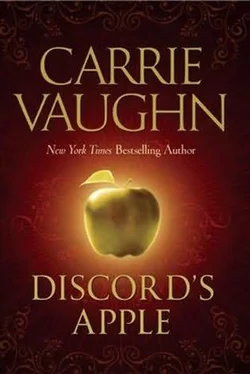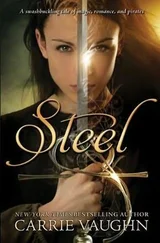“Salve,” the woman said. “I’ve heard that this is a place where objects may be safely stored.” She was holding a long slender bundle in black oilskin.
“Yes,” Lucinda said, and stepped aside. “Come in. May I offer refreshment? I have bread if you like, and some wine.”
“Thank you.” The woman entered and settled on one of the simple wooden chairs at the table by the hearth fire. The hut also contained a rope bed, a cupboard, and a door leading down to a root cellar.
Lucinda wished suddenly for finer surroundings, for silver dishes instead of ones of wood and clay, for a tiled floor instead of dirt. The woman was so regal, she might have been noble, certainly used to the Roman ways of more civilized regions. She didn’t feel ashamed for her surroundings—Anthony worked hard to keep them comfortable. But she wanted to do more.
“When is the baby due?” the woman asked.
Lucinda smiled. “Any day, I think.” Or rather, she hoped. She felt as ponderous as a mountain.
She set a clay plate before the woman and placed on it a portion of bread, cheese, and a sliced apple.
“This is lovely,” the woman said. “You are generous.”
“I wish I had more. Some meat or fish. This must seem like peasant fare to you.”
The woman closed her eyes and shook her head. “No, never think that. How many stories have you heard of the simple gifts given to witches by the roadside? The small gift, honestly given, is more valuable than the riches of kings.”
Lucinda lowered her gaze, abashed at the woman’s intensity.
The woman’s eyes creased, searching her. “You seem young to be the Keeper of this place.”
“My father died suddenly.” He’d fallen while searching for a lost sheep. The shock and pain of all his knowledge, the weight of all his responsibility crashing into her still ached.
“And you are his heir?”
She nodded.
“Then I will give you this.” The woman pulled the cloth away to reveal a sword. She pulled the weapon from its scabbard and lay it on the table.
It was a beautiful piece, well wrought and shining, simple and functional. It seemed to catch the light from the fire, take it into itself and glow. The grip was stained dark, where a hand had carried it for many years. Lucinda started to touch it, but hesitated, as if something held her back.
“His name is Excalibur,” said the woman, who ran a finger tenderly along the pommel. “He belongs to a king, who will return to claim him one day.”
“When?”
The woman’s gray eyes glinted. “I do not know. It could be many years.”
“It—he—is very powerful, isn’t he?”
“Yes. Can you keep him safe?”
With a conviction that wasn’t her own, but had followed her family for generations, she said, “Yes.”
Lucinda took hold of Excalibur and replaced it in its scabbard. “Good-bye,” the woman whispered as Lucinda went down into the cellar. She put the sword on a shelf cut into the earth, among the other boxes and sacks stored there. She felt its power, a tingle in her arm. But it slept peacefully in the place she had given it.
He must be a great king, to wield such a sword.
When she emerged aboveground, the old woman stood by the doorway.
“I took the bread and cheese—I hope you don’t mind,” she said. “I’m afraid I must travel now. I can’t stay.”
“All right.”
“Will you let me bless your child?”
A flush spread across Lucinda’s cheek. “Yes, please. I would be honored.”
And so the woman placed her hands on Lucinda’s rounded belly, where the heir of the family grew, and whispered words of strength and courage.
Then she turned away. With every step she took across the field—Lucinda’s cottage was far from any villages—she seemed more bent, more aged, and when Lucinda lost sight of her, she was like the witches of the stories.
Which she was, Lucinda supposed.
Apollo woke Sinon. When he spoke, his tone was serious, incongruous with the god’s usual demeanor. “If you keep quiet and act the part, you will see a thing few mortals have witnessed. A Council of the Gods.”
Sinon sat up, holding the coverlet around himself.
“Oh, look—is that a flash of curiosity in your eyes? Athena has called us to discuss your friend Odysseus. I would have you there to consult, since you know him. You can come as my servant if you promise to behave yourself. No tricks, no petty rebellions. I assure you, many of my colleagues are not as good-humored as I am. They’ll toss you off Olympus if they find you the least bit offensive. Do you promise?”
He nodded quickly. News of Odysseus! And to see Olympus.
“I must hear the words. Say it.”
“I promise.”
Apollo straightened, his arrogant smile returning. “Good.”
Phoebus Apollo dressed in gold, shimmering like the sun, and wore a circlet that gleamed with its own intense light. He garbed Sinon in a white silk chiton pinned with gold brooches, leaving much of his muscular chest and arms exposed. His beard was closely trimmed, his hair tied back with a gold ribbon. Apollo brought him to a doorway. Sinon had always thought it led to a closet, but Apollo slid back the screen, and beyond the door lay nothing, a shadow, featureless space.
“You will stand behind my chair and keep my goblet filled. Deliver messages if I need you to. Keep your head bowed, and keep your thoughts to yourself. Think of wool or fog if you must think of something. They won’t be able to read you so easily. Do not speak unless I give you permission, not even if Zeus himself asks you a question.”
“Zeus will be there?” Sinon blinked, feeling suddenly ill.
Apollo smirked. “Of course. Now remember, behave yourself.”
They stepped through the doorway. For a lurching moment, Sinon thought he had stepped off a cliff: his stomach turned, his mind felt dizzy, his feet tumbled over his head—But he took a second step and felt stone under his feet. He opened his eyes.
The stories told of a lofty palace, vast spaces capable of holding the heavens and filled with the blinding light of the gods, overwhelming to the eyes of mortals, inducing awe and madness.
In fact, Sinon walked on the stone base of a great bowl that had been cut out of the side of a hill. Tiers made of cracked and weathered stone, shining in the sun, had been built up one side, forming a hundred rows of benches that curved around and looked down upon the central floor. Every seat had a vantage, and the depression trapped sound. Footsteps echoed. A grove of trees closed in the other half of the circle. Sinon couldn’t see beyond to look for landmarks on the chance he might recognize the place. The sky above was blue, flecked with clouds, and he smelled the ocean on a slight breeze.
“What is this place?” Sinon asked breathlessly.
“An amphitheater. Athena’s design. In another five hundred years, I imagine they’ll be littered all over Greece.”
Without a second glance, Apollo strode forward into the plaza. Sinon followed, trying to show indifference.
On the central floor—the stage—a dozen chairs, gleaming white, made of ivory perhaps, sat in a circle. Beside each chair was a small table with a silver goblet and pitcher, and a tray of delicacies. Several people, dressed much like Sinon was, their gazes downcast, went from table to table, filling pitchers and trays with wine and food. Others stood by the chairs, meek and unmoving. Servants. Slaves. All mortal, Sinon thought.
Читать дальше












